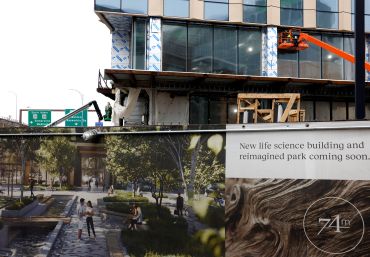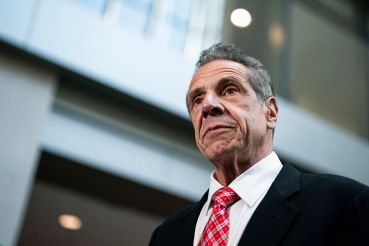Secondary Markets Strong, Amazon a Heartbreaker: CO Panelists
By Lauren Elkies Schram March 14, 2019 7:48 am
reprints
The U.S. markets outside of the gateway cities are becoming viable alternatives to places like New York City, Kenneth Fisher said on Commercial Observer’s panel, “U.S. Developers’ Outlook,” at the annual MIPIM property market conference in Cannes, France, on Wednesday.
The Fisher Brothers partner speaks from experience as AllianceBernstein is ditching New York City, where it leases 1 million square feet from Fisher Brothers at 1345 Avenue of the Americas, for Nashville.
“These secondary cities [or] tertiary cities are beginning to compete with the gateway cities with all kinds of incentives across the board to attract these tenants, especially the ones that are looking to employ the millennials, which is just about every firm that’s out there,” Fisher said.
Panelist David Steinbach, a senior managing director and CIO at Hines, said that a number of the secondary and tertiary cities are “very, very pro-growth and are frankly very easy for developers developing compared to a lot of the gateway markets,” which makes them appealing.
When it comes to investing in such markets, Steinbach said Hines’ focus is on yield.
“When we talk about investing in some of the secondary markets the question we always ask ourselves is—are we chasing yield,” Steinbach said. “That that’s something that came up in the last cycle, right? Those people were chasing yield. We don’t want to do that. We want to make smart investment decisions that stand above a cycle and we’re not just chasing yield. But I think with that said there truly are some shifts that are occurring and I think that the desirability of a lot of these markets is increasing significantly.”
Bruce Mosler, the chairman of global brokerage at Cushman & Wakefield (CWK) and the panel’s moderator, said he thought that Steinbach was “very right when [he said that] people will be careful about yield chasing. They’ll go where there’s a diverse tenant base and where the development opportunities are sustainable.”
Meanwhile, demand has not waned in gateway markets, Mosler assured.
“If you look at New York by way of example,” he said, “36 million square feet of new space was leased last year and year over year that was an increase from 31 million feet. So that’s an increase of almost 16 percent; demand is high.”
While technology has driven development in New York City, it has also done so in secondary markets across the country.
“If you look at a city like Austin, Texas,” Steinbach said, “it’s unbelievable how tech has literally shaped so much of that city now compared to 20 years ago [when] it was just a state capital, a university.”
There was, however, plenty of discussion of what’s happening in one gateway city in particular: New York City.
Regarding Amazon reneging on Long Island City, Queens, for a second headquarters, Steinbach said he speculates that in hindsight the e-commerce giant “probably would have done some things differently.” He envisions that deals of this ilk in the future will involve “more consensus building” and the process “won’t feel like an auction where the highest bidder in terms of tax abatements and things like that wins.”
Fisher and Mosler questioned the level of communication around the benefits Amazon was going to get. (The company would have received roughly $3 billion in tax benefits in the move.)
“At the end of the day, you have to wonder if those who were challenging it really understood it,” Fisher said.
Mosler offered a similar sentiment.
“It’s too early in my view to do a complete sort of biopsy of what occurred,” Mosler said, “but clearly we have to have down the road a better explanation of how incentives work in the city so that both the participants, and at the end of the day everyone else involved, understand the economics of the incentives.”
Fisher said that he worries about the impact Amazon’s pullout will have on New York City’s ability to draw new tenants of Amazon’s caliber.
“There are other cities that are aggressively competing for tenants like Amazon and you wonder [whether] other tenants are going to think twice about coming into New York whether it be in Long Island City or whether it be in Manhattan or any of the boroughs, and what kind of a welcome they’re going to get in terms of the concessions,” Fisher said. “Everybody wants to be wooed. Everybody wants to be welcomed with open arms. And the question is—how is our [approach] going to be going forward?”
No need to worry about New York City, Mosler assured.
“I think New York City is going to be just fine,” the broker said. “New York’s tech growth will continue to outpace the nation’s in terms of the companies that want to be there.”


